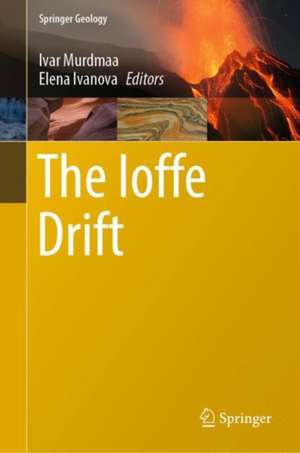The Ioffe Drift: Springer Geology
Editat de Ivar Murdmaa, Elena Ivanovaen Limba Engleză Hardback – 26 oct 2021
| Toate formatele și edițiile | Preț | Express |
|---|---|---|
| Paperback (1) | 885.63 lei 6-8 săpt. | |
| Springer International Publishing – 27 oct 2022 | 885.63 lei 6-8 săpt. | |
| Hardback (1) | 891.65 lei 6-8 săpt. | |
| Springer International Publishing – 26 oct 2021 | 891.65 lei 6-8 săpt. |
Din seria Springer Geology
- 18%
 Preț: 966.15 lei
Preț: 966.15 lei - 15%
 Preț: 711.12 lei
Preț: 711.12 lei - 18%
 Preț: 1248.02 lei
Preț: 1248.02 lei - 18%
 Preț: 791.88 lei
Preț: 791.88 lei - 18%
 Preț: 944.99 lei
Preț: 944.99 lei - 18%
 Preț: 1136.74 lei
Preț: 1136.74 lei - 15%
 Preț: 658.55 lei
Preț: 658.55 lei - 18%
 Preț: 954.31 lei
Preț: 954.31 lei - 18%
 Preț: 2526.25 lei
Preț: 2526.25 lei - 15%
 Preț: 654.77 lei
Preț: 654.77 lei - 18%
 Preț: 913.44 lei
Preț: 913.44 lei - 18%
 Preț: 1015.23 lei
Preț: 1015.23 lei - 18%
 Preț: 1404.30 lei
Preț: 1404.30 lei - 18%
 Preț: 964.71 lei
Preț: 964.71 lei - 18%
 Preț: 789.65 lei
Preț: 789.65 lei - 18%
 Preț: 948.92 lei
Preț: 948.92 lei - 18%
 Preț: 1127.28 lei
Preț: 1127.28 lei - 18%
 Preț: 1248.02 lei
Preț: 1248.02 lei - 18%
 Preț: 950.84 lei
Preț: 950.84 lei - 24%
 Preț: 1123.96 lei
Preț: 1123.96 lei - 15%
 Preț: 643.16 lei
Preț: 643.16 lei - 18%
 Preț: 972.93 lei
Preț: 972.93 lei - 18%
 Preț: 960.78 lei
Preț: 960.78 lei - 18%
 Preț: 787.47 lei
Preț: 787.47 lei - 18%
 Preț: 723.69 lei
Preț: 723.69 lei - 15%
 Preț: 641.20 lei
Preț: 641.20 lei - 15%
 Preț: 659.85 lei
Preț: 659.85 lei -
 Preț: 390.08 lei
Preț: 390.08 lei - 15%
 Preț: 657.08 lei
Preț: 657.08 lei - 20%
 Preț: 405.91 lei
Preț: 405.91 lei - 23%
 Preț: 876.15 lei
Preț: 876.15 lei - 18%
 Preț: 1246.47 lei
Preț: 1246.47 lei - 24%
 Preț: 946.58 lei
Preț: 946.58 lei - 18%
 Preț: 897.02 lei
Preț: 897.02 lei - 18%
 Preț: 948.29 lei
Preț: 948.29 lei - 18%
 Preț: 954.93 lei
Preț: 954.93 lei - 15%
 Preț: 640.06 lei
Preț: 640.06 lei - 18%
 Preț: 1126.65 lei
Preț: 1126.65 lei - 18%
 Preț: 955.40 lei
Preț: 955.40 lei - 18%
 Preț: 1010.96 lei
Preț: 1010.96 lei - 20%
 Preț: 563.35 lei
Preț: 563.35 lei - 18%
 Preț: 952.72 lei
Preț: 952.72 lei - 24%
 Preț: 845.44 lei
Preț: 845.44 lei - 18%
 Preț: 945.92 lei
Preț: 945.92 lei - 15%
 Preț: 651.84 lei
Preț: 651.84 lei
Preț: 891.65 lei
Preț vechi: 1087.38 lei
-18% Nou
Puncte Express: 1337
Preț estimativ în valută:
170.63€ • 177.07$ • 142.62£
170.63€ • 177.07$ • 142.62£
Carte tipărită la comandă
Livrare economică 17-31 martie
Preluare comenzi: 021 569.72.76
Specificații
ISBN-13: 9783030828707
ISBN-10: 3030828700
Pagini: 195
Ilustrații: VII, 195 p. 79 illus., 63 illus. in color.
Dimensiuni: 155 x 235 mm
Greutate: 0.46 kg
Ediția:1st ed. 2021
Editura: Springer International Publishing
Colecția Springer
Seria Springer Geology
Locul publicării:Cham, Switzerland
ISBN-10: 3030828700
Pagini: 195
Ilustrații: VII, 195 p. 79 illus., 63 illus. in color.
Dimensiuni: 155 x 235 mm
Greutate: 0.46 kg
Ediția:1st ed. 2021
Editura: Springer International Publishing
Colecția Springer
Seria Springer Geology
Locul publicării:Cham, Switzerland
Cuprins
Introduction.- Regional setting.- Regional stratigraphic frames based on calcareous microfossils.- Materials.- The Ioffe Drift geomorphology and seismic stratigraphy.- Lithology and sedimentology.- Micropaleontology and stratigraphy.- Ferromanganese nodules.- Hiatuses and core correlations .- The Ioffe Drift history and mechanisms of sedimentation.- Conclusions and Perspectives.
Notă biografică
Prof. Ivar Murdmaa, habilitated DSci on geology and mineralogy, Senior Researcher at Shirshov Institute of Oceanology RAS, participant of 37 marine expeditions including 4 deep sea drilling legs. His major scientific interests include lithology, sedimentology, facies and formations of oceanic sediments, ferromanganese nodules. During the last decade, he studied the lithology and formation of contourites from the Southern and Central Atlantic.
Prof. Elena Ivanova, habilitated DSci on oceanology and marine geology, Head of the Laboratory of Paleoceanology at Shirshov Institute of Oceanology RAS, participant of 22 marine expeditions and Chief scientist in 6 of them, guest scientist at several research institutes in France, UK, Germany, USA. Her major scientific interests include mechanisms on global teleconnections based on the study of high-resolution paleodata timeseries, contourite stratigraphy and bottom-water circulation in the Southern and CentralAtlantic.
Textul de pe ultima copertă
The Discovery of the calcareous Ioffe Drift in the SW Atlantic in 2010 opens new perspectives in the contourite theory. Although demonstrating similar behavior relative to bottom water dynamics, rather rare and poorly studied calcareous contourites differ from their terrigenous analogs in origin, grain-size distribution, chemical and mineral composition of sedimentary particles. The detailed multidisciplinary study of the Ioffe Drift produces new knowledge on biogenic contourites deposited in pelagic realm, in conditions of low biological productivity and terrigenous material supply, under the influence of the Antarctic Bottom Water flow from the Vema Channel. The major intervals of prevailing erosion are inferred on the drift from 2.51/2.59 to 1.9 Ma and from 1.6 to 0.81 Ma thus indicating strong paleoceanographic changes most likely associated with the reorganization of deep-sea circulation and increased bottom water production in the Southern Ocean during the Early Pleistocene and,in particular, around the Mid-Pleistocene Transition.
Caracteristici
Opens new approaches and perspectives in the contourite theory Provides a new knowledge on biogenic contourites deposited in the low-productivity pelagic realm Broadens understanding of erosion-accumulation activity of the Antarctic Bottom Water
